| Listing 1 - 7 of 7 |
Sort by
|
Book
Year: 2004 Publisher: [Place of publication not identified] Institute of Electrical Engineers
Abstract | Keywords | Export | Availability | Bookmark
 Loading...
Loading...Choose an application
- Reference Manager
- EndNote
- RefWorks (Direct export to RefWorks)
Software reengineering --- Computer software --- Reusability
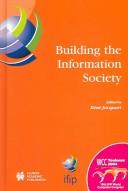
ISBN: 140208157X Year: 2004 Publisher: New York, NY : Springer US : Imprint: Springer,
Abstract | Keywords | Export | Availability | Bookmark
 Loading...
Loading...Choose an application
- Reference Manager
- EndNote
- RefWorks (Direct export to RefWorks)
In the context of the 18th IFIP World Computer Congress (WCC’04), and beside the traditional organization of conferences, workshops, tutorials and student forum, it was decided to identify a range of topics of dramatic interest for the building of the Information Society. This has been featured as the "Topical day/session" track of the WCC’04. Topical Sessions have been selected in order to present syntheses, latest developments and/or challenges in different business and technical areas. Building the Information Society provides a deep perspective on domains including: the semantic integration of heterogeneous data, virtual realities and new entertainment, fault tolerance for trustworthy and dependable information infrastructures, abstract interpretation (and its use for verification of program properties), multimodal interaction, computer aided inventing, emerging tools and techniques for avionics certification, bio-, nano-, and information technologies, E-learning, perspectives on ambient intelligence, the grand challenge of building a theory of the Railway domain, open source software in dependable systems, interdependencies of critical infrastructure, social robots, as a challenge for machine intelligence. Building the Information Society comprises the articles produced in support of the Topical Sessions during the IFIP 18th World Computer Congress, which was held in August 2004 in Toulouse, France, and sponsored by the International Federation for Information Processing (IFIP).
Computer software—Reusability. --- Computers. --- Performance and Reliability. --- Theory of Computation.
Book
Year: 2004 Publisher: [Place of publication not identified] Institute of Electrical Engineers
Abstract | Keywords | Export | Availability | Bookmark
 Loading...
Loading...Choose an application
- Reference Manager
- EndNote
- RefWorks (Direct export to RefWorks)
Software reengineering --- Computer software --- Engineering & Applied Sciences --- Computer Science --- Reusability
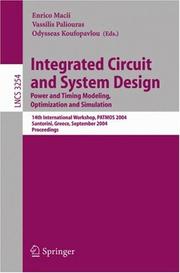

ISBN: 3540230955 3540302050 Year: 2004 Publisher: Berlin, Heidelberg : Springer Berlin Heidelberg : Imprint: Springer,
Abstract | Keywords | Export | Availability | Bookmark
 Loading...
Loading...Choose an application
- Reference Manager
- EndNote
- RefWorks (Direct export to RefWorks)
WelcometotheproceedingsofPATMOS2004,thefourteenthinaseriesofint- national workshops. PATMOS 2004 was organized by the University of Patras with technical co-sponsorship from the IEEE Circuits and Systems Society. Over the years, the PATMOS meeting has evolved into an important - ropean event, where industry and academia meet to discuss power and timing aspects in modern integrated circuit and system design. PATMOS provides a forum for researchers to discuss and investigate the emerging challenges in - sign methodologies and tools required to develop the upcoming generations of integrated circuits and systems. We realized this vision this year by providing a technical program that contained state-of-the-art technical contributions, a keynote speech, three invited talks and two embedded tutorials. The technical program focused on timing, performance and power consumption, as well as architectural aspects, with particular emphasis on modelling, design, charac- rization, analysis and optimization in the nanometer era. This year a record 152 contributions were received to be considered for p- sible presentation at PATMOS. Despite the choice for an intense three-day m- ting, only 51 lecture papers and 34 poster papers could be accommodated in the single-track technical program. The Technical Program Committee, with the - sistance of additional expert reviewers, selected the 85 papers to be presented at PATMOS and organized them into 13 technical sessions. As was the case with the PATMOS workshops, the review process was anonymous, full papers were required, and several reviews were received per manuscript.
Conferences - Meetings --- Engineering. --- Arithmetic and logic units, Computer. --- Logic design. --- Computer software --- Microprocessors. --- Computers. --- Electronics. --- Microelectronics. --- Electronics and Microelectronics, Instrumentation. --- Theory of Computation. --- Logic Design. --- Performance and Reliability. --- Processor Architectures. --- Arithmetic and Logic Structures. --- Reusability. --- Microminiature electronic equipment --- Microminiaturization (Electronics) --- Electronics --- Microtechnology --- Semiconductors --- Miniature electronic equipment --- Electrical engineering --- Physical sciences --- Automatic computers --- Automatic data processors --- Computer hardware --- Computing machines (Computers) --- Electronic brains --- Electronic calculating-machines --- Electronic computers --- Hardware, Computer --- Computer systems --- Cybernetics --- Machine theory --- Calculators --- Cyberspace --- Minicomputers --- Reusability of software --- Reusable code (Computer programs) --- Software reusability --- Software reengineering --- Generic programming (Computer science) --- Design, Logic --- Design of logic systems --- Digital electronics --- Electronic circuit design --- Logic circuits --- Switching theory --- Arithmetic and logic units, Computer --- Computer arithmetic --- Electronic digital computers --- Construction --- Industrial arts --- Technology --- Circuits --- Integrated circuits --- Very large scale integration --- Computer-aided design --- Information theory. --- Operating systems (Computers). --- Computer science. --- Informatics --- Science --- Computer operating systems --- Computers --- Disk operating systems --- Systems software --- Communication theory --- Communication --- Operating systems --- Computer software—Reusability.
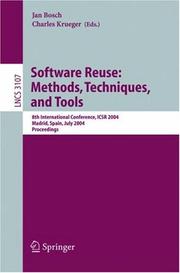
ISSN: 03029743 ISBN: 3540223355 9783540223351 3540277994 Year: 2004 Volume: 3107 Publisher: Berlin, Heidelberg : Springer Berlin Heidelberg : Imprint: Springer,
Abstract | Keywords | Export | Availability | Bookmark
 Loading...
Loading...Choose an application
- Reference Manager
- EndNote
- RefWorks (Direct export to RefWorks)
After three decades of research and practice,reuse of existing software artefacts remains the most promising approach to decreasing effort for software development and evolution, increasing quality of software artefacts and decreasing time to market of software products. Over time, we have seen impressive improvements, in extra-organizational reuse,e.g.COTS, as well as in intra-organizational reuse, e.g. software product families. Despite the successes that we, as a community, have achieved, several challenges remain to be addressed. The theme for this eighth meeting of the premier international conference on software reuse is the management of software variability for reusable software. All reusable software operates in multiple contexts and has to accommodate the differences between these contexts through variation. In modern software, the number of variation points may range in the thousands with an even larger number of dependencies between these points. Topics addressing the theme include the representation, design, assessment and evolution of software variability. The proceedings that you are holding as you read this report on the current state-of-the-art in software reuse.Topics covered in the proceedings include software variability, testing of reusable software artefacts, feature modeling, aspect-oriented software development, composition of components and services, model-based approaches and several other aspects of software reuse. May 2004 Jan Bosch Charles Krueger Organizing Committee General Chair Kyo C. Kang, Pohang University of Science and Technology, Korea Program Co-chairs Jan Bosch, University of Groningen, The Netherlands Charles Krueger, BigLever Software, Inc., U.S.A.
Computer software --- Reusability --- Computer Appl. in Administrative Data Processing. --- Computer science. --- Software engineering. --- Computer programming. --- Application software. --- Management information systems. --- Computer Science. --- Software Engineering/Programming and Operating Systems. --- Software Engineering. --- Management of Computing and Information Systems. --- Programming Techniques. --- Information Systems. --- Information systems. --- Informatics --- Science --- Computer software engineering --- Engineering --- Application computer programs --- Application computer software --- Applications software --- Apps (Computer software) --- Computers --- Electronic computer programming --- Electronic data processing --- Electronic digital computers --- Programming (Electronic computers) --- Coding theory --- Computer-based information systems --- EIS (Information systems) --- Executive information systems --- MIS (Information systems) --- Sociotechnical systems --- Information resources management --- Management --- Programming --- Communication systems --- Computer software - Reusability - Congresses
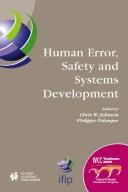
ISBN: 1280537809 9786610537808 1402081537 1402081529 Year: 2004 Publisher: New York, NY : Springer US : Imprint: Springer,
Abstract | Keywords | Export | Availability | Bookmark
 Loading...
Loading...Choose an application
- Reference Manager
- EndNote
- RefWorks (Direct export to RefWorks)
Recent accidents in a range of industries have increased concern over the design, development, management and control of safety-critical systems. Attention has now focused upon the role of human error both in the development and in the operation of complex processes. Human Error, Safety and Systems Development gathers contributions from practitioners and researchers presenting and discussing leading edge techniques that can be used to mitigate the impact of error (both system and human) on safety-critical systems. Some of these contributions can be easily integrated into existing systems engineering practices while others provide a more theoretical and fundamental perspective on the issues raised by these kinds of interactive systems. More precisely the contributions cover the following themes: –Techniques for incident and accident analysis; –Empirical studies of operator behaviour in safety-critical systems; –Observational studies of safety-critical systems; –Risk assessment techniques for interactive systems; –Safety-related interface design, development and testing; –Formal description techniques for the design and development of safety-critical interactive systems. Many diverse sectors are covered, including but not limited to aviation, maritime and the other transportation industries, the healthcare industry, process and power generation and military applications. This volume contains 20 original and significant contributions addressing these critical questions. The papers were presented at the 7th IFIP Working Group 13.5 Working Conference on Human Error, Safety and Systems Development, which was held in August 2004 in conjunction with the 18th IFIP World Computer Congress in Toulouse, France, and sponsored by the International Federation for Information Processing (IFIP).
Industrial safety --- Human engineering. --- Technological innovations --- Engineering. --- Operating systems (Computers). --- Social sciences --- Engineering, general. --- Performance and Reliability. --- Computer Appl. in Social and Behavioral Sciences. --- Data processing. --- Computer software—Reusability. --- Application software. --- Application computer programs --- Application computer software --- Applications software --- Apps (Computer software) --- Computer software --- Construction --- Industrial arts --- Technology --- Ergonomics --- Human factors in engineering design --- Bioengineering --- Environmental engineering --- Industrial engineering --- Human comfort --- Human-robot interaction --- Industrial accidents --- Industries --- Job safety --- Occupational hazards, Prevention of --- Occupational health and safety --- Occupational safety and health --- Prevention of industrial accidents --- Prevention of occupational hazards --- Safety, Industrial --- Safety engineering --- Safety measures --- Safety of workers --- Accidents --- System safety --- Prevention --- Computers. --- Technology and Engineering. --- Hardware Performance and Reliability. --- Computer Application in Social and Behavioral Sciences.
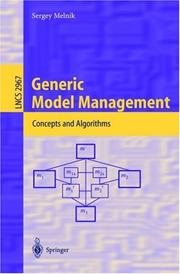
ISBN: 1280307471 9786610307470 3540246843 3540219803 Year: 2004 Publisher: Berlin, Heidelberg : Springer Berlin Heidelberg : Imprint: Springer,
Abstract | Keywords | Export | Availability | Bookmark
 Loading...
Loading...Choose an application
- Reference Manager
- EndNote
- RefWorks (Direct export to RefWorks)
Many challenging problems in information systems engineering involve the manipulation of complex metadata artifacts or models, such as database schema, interface specifications, or object diagrams, and mappings between models. Applications solving metadata manipulation problems are complex and hard to build. The goal of generic model management is to reduce the amount of programming needed to solve such problems by providing a database infrastructure in which a set of high-level algebraic operators are applied to models and mappings as a whole rather than to their individual building blocks. This book presents a systematic study of the concepts and algorithms for generic model management. The first prototype of a generic model management system is described, the algebraic operators are introduced and analyzed, and novel algorithms for implementing them are developed. Using the prototype system and the operators presented, solutions are developed for several practically relevant problems, such as change propagation and reintegration.
Computer science. --- Software engineering. --- Logic design. --- Database management. --- Information storage and retrieval systems. --- Artificial intelligence. --- Computer Science. --- Information Storage and Retrieval. --- Database Management. --- Software Engineering. --- Artificial Intelligence (incl. Robotics). --- Programming Languages, Compilers, Interpreters. --- Logics and Meanings of Programs. --- Generic programming (Computer science) --- Computer Science --- Engineering & Applied Sciences --- Programming languages (Electronic computers). --- Information storage and retrieval. --- Software Engineering/Programming and Operating Systems. --- Computer programming --- Computer software --- Reusability --- Information storage and retrieva. --- Artificial Intelligence. --- Informatics --- Science --- AI (Artificial intelligence) --- Artificial thinking --- Electronic brains --- Intellectronics --- Intelligence, Artificial --- Intelligent machines --- Machine intelligence --- Thinking, Artificial --- Bionics --- Cognitive science --- Digital computer simulation --- Electronic data processing --- Logic machines --- Machine theory --- Self-organizing systems --- Simulation methods --- Fifth generation computers --- Neural computers --- Data base management --- Data services (Database management) --- Database management services --- DBMS (Computer science) --- Generalized data management systems --- Services, Database management --- Systems, Database management --- Systems, Generalized database management --- Computer software engineering --- Engineering --- Automatic data storage --- Automatic information retrieval --- Automation in documentation --- Computer-based information systems --- Data processing systems --- Data storage and retrieval systems --- Discovery systems, Information --- Information discovery systems --- Information processing systems --- Information retrieval systems --- Machine data storage and retrieval --- Mechanized information storage and retrieval systems --- Computer systems --- Electronic information resources --- Data libraries --- Digital libraries --- Information organization --- Information retrieval --- Computer languages --- Computer program languages --- Computer programming languages --- Machine language --- Languages, Artificial
| Listing 1 - 7 of 7 |
Sort by
|

 Search
Search Feedback
Feedback About UniCat
About UniCat  Help
Help News
News